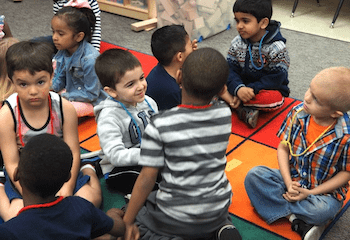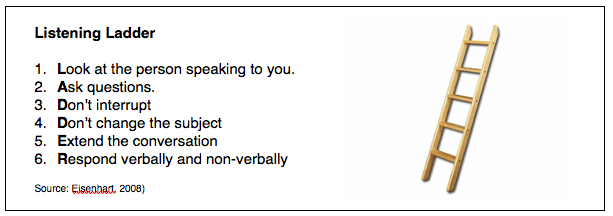Fostering Academic Language Development in Primary Grades

Language skills and literacy achievement are highly correlated. The Report of the National Early Literacy Panel (Lonigan & Shanahan, 2008) found that oral language – the ability to produce or comprehend spoken language, including vocabulary and grammar – is correlated with later literacy achievement. The more children know about language, the better equipped they are to succeed in reading and writing.
Furthermore, the language children are exposed to at home and in school influences the development of their language comprehension. This, in turn, influences their ability to develop reading and writing skills. Language development in the preschool years is relevant to the later teaching of reading and writing, especially in the primary grades.
The level of language proficiency children bring to kindergarten is varied and depends on how much exposure to oral language they have had prior to entering school. Seminal research conducted by Hart and Risley (1995) and replicated by others Fernald, Marchman & Weisleder (2013) determined that there are large discrepancies in oral language development and the gap between language-advanced and language-delayed children grows throughout the elementary years (Biemiller, 2001). All students, but especially those with limited language exposure, benefit from classroom instruction that is designed to accelerate language learning and growth in the use of academic language.
Academic language includes academic vocabulary (more formal words typically associated with content learned in school) and syntactic awareness (the ability to recognize and use the correct arrangement of words in sentences typically found in the formal text used in school). If primary grade teachers are planful and purposeful about incorporating language-development activities, they can play an important role in closing the language gap before students move beyond grade 3.
Teach Listening Skills
It is important to teach students about receptive language. Specifically, they need to understand that the goal of using receptive language is not just “hearing” what someone is saying, but also “listening and thinking” about what they are saying. Consider using the visuals below to illustrate the difference for students.

Here are some suggestions for teaching speaking and listening skills:
- Explicitly teach students how to be good listeners, including role-playing.
- Encourage students to make eye contact with the speaker when listening.
- Teach students to be aware of non-verbal communication while listening.
- Teach students to take turns and not interrupt while listening.
- Teach students to ask questions to clarify understanding.
- Model good listening skills by genuinely listening to your students.
- Promote active listening to solve conflicts.
- Provide conversation centers in the classroom that encourage conversation and attentive listening.
- Conduct games in which you call out directions and instructions for students to follow such as Follow the Leader and Simon Says.
- Play The Whisper Chain game: whisper an action message to the first student, then each student passes the message around a circle; the last student performs the action.
- Provide access to audiobooks.
The “Listening Ladder” is a helpful tool for reminding students how to be a good listener (see below).

Model Challenging Academic Language
How teachers talk with children is important! To help students develop strong oral language skills, it is important for teachers to be sure that their language interactions give practice with the following:
- Hearing and using rich and abstract vocabulary
- Hearing and using increasingly complex sentences
- Using words to express ideas and to ask questions about things they don’t understand
Academic language is:
- the language used in the classroom
- the language of text
- the language of assessments
- the language of academic success
As models of academic language for young students, teachers should speak with precision and correctness. Teachers must be conscious of their own language in the classroom, being careful not to “dumb down” the way they speak by purposely using basic vocabulary and simple sentences. Likewise, teachers should encourage students to use precise and extended language.
Here are some suggestions for modeling and encouraging use of academic language:
- Set high expectations for language use for yourself and students, including use of challenging vocabulary and sentence structure.
- Use sophisticated words when talking with students to expand their vocabularies.
- Expand and recast students’ utterances.
- Draw students’ attention to fluctuations in speech rate and words that are stressed depending on the situation (e.g., giving directions, being funny, being upset about something).
- Emphasize intonation and model appropriate stress patterns when speaking.
- Emphasize punctuation use when reading aloud.
- Ask students to restate or paraphrase what others have said.
- Model for students how to extend answers to questions and ask them to do the same.
Ask yourself these questions to help make sure you are supporting academic language:
- Is my curriculum and classroom environment rich in print, literature, and language?
- Do I provide time for children to look, listen, and talk about books?
- Do I integrate writing, speaking, listening, and reading into all content areas?
- Do I encourage students to talk and write about personal experiences and ideas?
This blog entry is excerpted from the book Keys to Early Writing by Joan Sedita. To order the book or take the related online training course, visit the Keys to Literacy website.
References:
Biemiller, A. (2001). Language and reading success. Newton Upper Falls, MA: Brookline Books
Fernald, A., Marchman, V. A., & Weisleder, A. (2013). SES differences in language processing skill and vocabulary are evident at 18 months. Developmental Science (16) 2, pp. 234-248.
Hart, B., & T.R. Risley. (1995). Meaningful Differences in the Everyday Experience of Young American Children. Baltimore: Brookes
Lonigan, C. & Shanahan, T. (2008). Developing early literacy: Report of the National Early Literacy Panel. Washington, DC: National Institute for Literacy.

 Joan Sedita is the founder of Keys to Literacy and author of the Keys to Literacy professional development programs. She is an experienced educator, nationally recognized speaker and teacher trainer. She has worked for over 35 years in the literacy education field and has presented to thousands of teachers and related professionals at schools, colleges, clinics, and professional conferences.
Joan Sedita is the founder of Keys to Literacy and author of the Keys to Literacy professional development programs. She is an experienced educator, nationally recognized speaker and teacher trainer. She has worked for over 35 years in the literacy education field and has presented to thousands of teachers and related professionals at schools, colleges, clinics, and professional conferences.
Leave a Reply